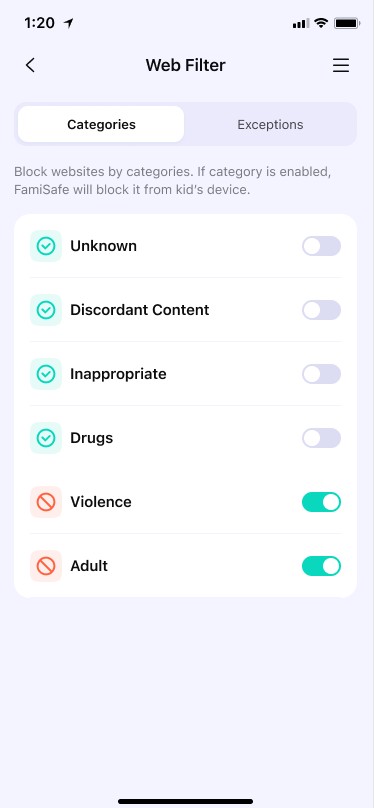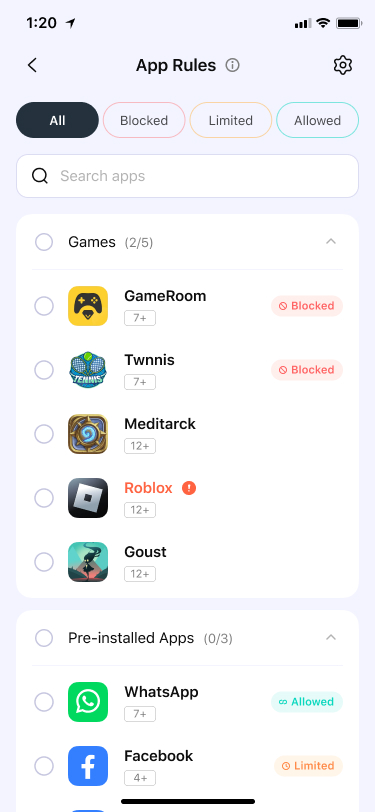Parental Guide to Protecting Kids Against Live Streaming Apps
Parent guide to live-streaming apps
ALL TOPICS
- Blocker App
-
- Best free call blocker app for Android
- Block Discord on Phone, Computer and Chromebook
- Best call blocker apps
- Website blocker apps and chrome extension
- Website blocker apps for studying
- Message blocker apps
- A Complete Guide to Block TikTok for Your Kids
- Steps to Block and Unblock TikTok from Network Router
- Game Blocker
- Social Media Blocker
- Lock
Dec 12, 2025 Filed to: Block Apps Proven solutions

Today, countless live streaming apps are available on every corner of the web, but how much do you really know about them? Most parents know all about streaming platforms like YouTube. However, that's as far as their knowledge goes.
Truth be told, live streaming apps have their good and bad sides. For example, live streaming apps can help your business improve customer and employee engagement through regular conferences and meetings.
On the other hand, these apps can also negatively impact viewers by presenting them with inappropriate content. If you don't want your kids to stumble upon explicit streaming videos, keep reading to learn more about live streaming apps, their benefits, and their negative aspects.
Table of Content
Part 1: What Are Live Streaming Apps?

A live stream app is a video hosting service that relies on embedded live streaming technology to broadcast visual content in real-time. Most live streaming apps allow you to watch live videos, exchange reactions with other users, share comments, etc.
Since live streaming apps present such an attractive and trendy way to consume web content, they are like a magnet for kids. Your kids will use countless streaming platforms to enjoy hours of funny and entertaining videos.
However, things can get out of hand if you don't supervise the content your kids view on their devices. That's why you should take precautions to protect your loved ones from inappropriate streaming content, such as pornographic videos.
Benefits of Live Streaming Apps

Live streaming can benefit kids in various ways. First, it can help with building confidence. Each time your child creates a live stream video and shares it with their audience, they get a sense of achievement.
As their audience grows, your child becomes more confident about the things they do. In addition, live stream apps like Facebook Live work like social media networks. They allow your kids to connect with same-minded people and feel less socially isolated.
Building meaningful connections with other kids with similar interests is an essential part of developing a unique identity and learning social skills. Some free live streaming apps such as TikTok, Live.me, and YouTube enable kids to reap financial rewards by receiving virtual coins from their users.
These rewards can incentivize your children to earn from their live streaming efforts and learn a lot about financial responsibility. While this all sounds awesome, live streaming isn't without its downsides.
Negative Aspects of Live Streaming Apps

Whether your child creates or watches videos online, there are certain risks that you, as a parent, should know about. In countless live streaming videos, kids can discover things they should never see, ranging from nudity and real-time assaults to suicides.
Most internet users won't think twice about exploiting kids' innocence. On the other hand, kids will do crazy things if allowed to gain a wider audience, more likes, and instant fame. Since everything happens behind a screen, your kids may feel empowered to do things they may never think of in real life.
Live streaming eliminates the chance to edit the content, meaning your child may share something private or intimate with total strangers. Finally, your kids may see inappropriate or explicit content that could impact their behavior and ideas. These are all legitimate reasons to get involved in your kids' live-streaming activities.
You may also like:
Part 2: How Kids Access Live Streaming Apps
Today, all a child needs to live stream is a mobile phone or a desktop computer with a camera and access to the internet. Kids can create and broadcast live videos on the web or social media platforms from home or a specific location in real time.
Kids are into all sorts of live stream apps these days, such as:
- YouTube Live
- Facebook Live
- Instagram Live
- Ustream
- LinkedIn Live
- Twitch
- TikTok Live
- Bigo Live
- LiveMe
- Brightcove
- Wowza
- Vimeo
- StreamEast
Live streaming is incredibly popular among kids and young people. While it's no wonder that so many of them enjoy the perks of creating live streams and vlogs, the problem is that most of them are watching the content.
Whether they want to monitor the latest trends, stay up-to-date with their favorite artists, or stay on top of the latest games they adore, live streaming can benefit your kids.
Part 3: Harmful Live Stream Apps
Here's a list of harmful live stream apps you should know:
- Hype
- Periscope
- YouNow
Read on to find out how these apps can harm your children.
Name a Few and Talk About How They Can Harm Kids.
Learn more about the harmful live stream apps that can negatively impact your kids.
Hype

Age Rating: PG-13
Kids-friendly:⭐⭐
Potential threats: Cyberbullying, harassment, privacy risks, explicit content
Hype is a live stream app that uses your kid's Facebook login details to give them access to the streaming content. Although the app constantly updates its security and preventive measures, kids can still run into live stream porn videos.
The app supports 13+ users and requires the parent's confirmation to verify a kid's account. While the app tries to protect younger users, such as your kids, there are no means to filter out the explicit content that enters the platform.
Periscope

Age Rating: X
Kids-Friendly:⭐
Potential threats: predators, explicit content, privacy risks, violence
Periscope has been around for almost nine years now. It requires Twitter account details to log in. The problem with Periscope is that the platform doesn't regulate live streaming.
In other words, your kids could easily run into porn or any other explicit content. Since Periscope supports all age groups, there's no way to control the videos that enter your kid's feed.
YouNow

Age Rating: PG-13
Kids-Friendly:⭐⭐
Potential threats: privacy risks, predators, explicit content, violence, alcohol, tobacco, drug, profanity
Although the idea behind YouNow is good, the app has the ultimate flaw – it doesn't regulate teen users above 18. Kids below 18 must abide by specific rules. However, those rules don't apply to teens above 18. This freedom might pose a risk for your kids as they could easily run into explicit videos.
- Web Filter & SafeSearch
- Screen Time Limit & Schedule
- Location Tracking & Driving Report
- App Blocker & App Activity Tracker
- YouTube History Monitor & Video Blocker
- Social Media Texts & Porn Images Alerts
- Works on Mac, Windows, Android, iOS, Kindle Fire, Chromebook
Part 4: How To Make Sure Your Kids Aren't Using Harmful Live-stream Apps?
The best way to ensure your kids avoid harmful live stream apps is to use a parental control app, such as Wondershare FamiSafe. Apps like FamiSafe send you alerts when your children try to access or download harmful live stream content.
FamiSafe allows you to monitor your kid's device and online activity so you know when your loved ones are about to view harmful videos. The moment your children try to install harmful live-stream apps or join explicit live stream platforms, FamiSafe will send you instant alerts.
Here are some notable features to consider.
1. Web Filter

Protect your kids against harmful live stream videos by filtering out the content and removing harmful apps and sites from your kid's device. This feature enables you to prevent explicit videos from getting to your kids.
With FamiSafe, you can block harmful content categories you don't want your kids to see, monitor their browsing history on demand, and track their online activity.
2. App Rules

This feature lets you outline the apps and websites your kids shouldn't access. Go to the App Block feature and select the apps your kids shouldn't use. You can do it remotely from your phone.
In addition, you can also oversee the app activities of your kids and gather information on their online behavior, such as data usage, usage frequency, current state, usage time, etc. If you spot any irregularities in your kid's app usage, you can take adequate measures.
- Web Filter & SafeSearch
- Screen Time Limit & Schedule
- Location Tracking & Driving Report
- App Blocker & App Activity Tracker
- YouTube History Monitor & Video Blocker
- Social Media Texts & Porn Images Alerts
- Works on Mac, Windows, Android, iOS, Kindle Fire, Chromebook
Part 5: Teaching Kids About Using the Internet Responsibly
The best way to protect your kids against the dangers of the internet is to teach them to use the web responsibly. Engage with what your kids do online and talk to them regularly about the potential risks of oversharing their intimate details.
Encourage them to check their contacts online and be more cautious about how they share content and with who. Teach them to double-check the content they consume. Research the best practices for limiting your kids' personal information in their live streaming sessions.
If your kids are still small, you should look at live stream videos together to determine if they are appropriate for younger children. Use a parental control app like FamiSafe to ensure you can intervene if needed.
More importantly, teach your kids how to act if something goes wrong by showing them where and how to seek support if they need it.
Conclusion
Although live streaming apps have many upsides, they also have numerous downsides that can negatively impact your kids. If you don't want to expose your young ones to explicit and inappropriate online content, take matters into your hands.
Use a parental control app like FamiSafe to block kid-inappropriate apps, filter out the content your kids view, monitor their browsing history, and restrict them from downloading or installing explicit content.




Moly Swift
staff Editor